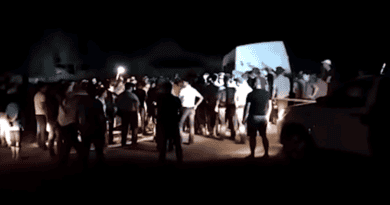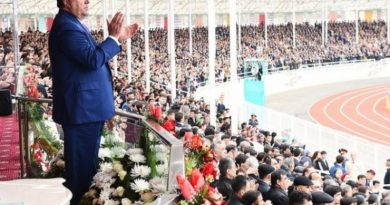Bot farms of Kazakhstan rebelled against ACCA
The story of the secret bot farms in Kazakhstan and those behind them made a lot of noise. The exclusive interview with a former employee of one of these bot farms at first did not attract the attention of a wide audience. However, in Nur-Sultan, the authorities began an active search for the one who provided ACCA with details of the functioning of this industry. After the search attempts were unsuccessful, the leaders of bot farms set the task for their units to discredit the publication, so that the Kazakh audience had a clear belief that everything told in the ACCA’s interview was nothing more than a fake.
The first to respond to the publication was the senior lecturer of the Department of Philosophy of the Kazakh Agro-Technical University named after S. Seifullin, Samat Nurtaza, who is also an expert at the Institute of Eurasian Integration, and partly, we recall, the head of the bot farm.
In a comment under a repost of this publication on Facebook by well-known Kazakh journalist Sergey Duvanov, Mr. Nurtaza wrote a kind of refutation.
“I am Samat Nurtaza, the press secretary of the Institute of Eurasian Integration. As a representative of this Institute, I officially declare that everything that is said in this article is fake and misinformation. Moreover, the site itself is a bot (in English bot, in Czech robot). It’s a special program that automatically and / or according to a given schedule performs any actions. Such an anonymous article can slander any person. There is no author of the article, the person, who allegedly gave the interview, is hidden. It means there is no news ground. You can write anonymously that Samat Nurtaza captured Mars and infects Martians with a coronavirus. For example, you recently traveled to the United States, and it would be possible to assume that you are a paid pro-American blogger and keeper of the State Department’s bot farm. However, we don’t think so and follow journalistic ethics. You are a person with a principled civic position, and we, although somewhere we don’t agree with your position, we respect it.”
However, Duvanov’s response remark that it would be good to provide evidence that all the written information is “lies”, Samat Nurtaza ignored.
By the way, on the page of Nurtaza, there are also no disclaimers or statements that he is the curator of one of the Kazakh bot farm. In the same way (i.e. in no way), the direct head of Nurtaza, the director of the Institute of Eurasian Integration, Erlan Sairov, reacted.
The information about the Institute of Eurasian Integration LLP was very curious. The institution’s website says that the Institute was created by a government decree on October 31, 2012.
The main activities of the institute are: conducting sociological and expert surveys to develop recommendations and proposals for the implementation of the state-communicative policy; preparation of analytical materials on the state of affairs in the field of civil society; analysis of the main directions of the implementation of domestic policy and the socio-political situation in Kazakhstan and the countries of CIS; implementation of scientific relations, contacts, exchange of information with Kazakh and international experts and organizations.
It turns out that the institution is strictly scientific. However, the Institute’s tax deductions may also be envied by a medium-sized private company. Judge for yourself. The data are official and taken from the website of the State Revenue Committee. In 2015, the institute made tax payments to the budget in the amount of $218 000; in 2016 – $323 000, in 2017 – $143 000, in 2018 – $182 000, in 2019 – $226 900.
By the way, the information about Kazmedia was very interesting, where, as you remember, according to our interlocutor, there is another bot farm. It turns out that the construction of this TV and radio complex cost $318.3 million. Such figures are indicated in the project prospectus for the issue of international bonds of National Company JSC “Kazakhstan Temir Zholy” (KTZ-Kazakh Railways). See below what it says.
“The government can force the Group (i.e. KTZ) to engage in activities that are not related to its main activities, or to acquire assets for its business as part of operations that are not carried out at arm’s length, such as the TV and radio complex in Astana, which the government entrusted to the Group to build and transfer to Samruk-Kazyna (national welfare fund “Samruk-Kazyna”) without compensation. The Group incurred total expenses in the amount of 58.9 billion KZT for the construction of the TV and radio complex, the supply of media and technical equipment, and the acquisition of land. In July 2012, the building of the TV and radio complex, together with the land on which it is located, was transferred to the Department of State Property and Privatization of Astana, which, in turn, accepted the TV and radio complex and put it on the balance of the Information and Archives Committee under the Ministry of Culture and Information of the Republic of Kazakhstan (hereinafter referred to as the “Information and Archives Committee”) in accordance with the order of the Chairman of the State Property and Privatization Committee under the Ministry of Finance of the Republic of Kazakhstan (“State Property Committee”) No.678 dated July 16, 2012. In accordance with the same decree, the Information and Archive Committee was entrusted with transferring the TV and radio complex to trust management of Kazmedia Ortalygy Company LLP until the TV and radio complex was capitalized in the authorized capital.
That is, this project clearly shows that the money of one state-owned enterprise (which is KTZ) is not spent on the development of railways and railway stations, but on completely different goals … By the way, Kazmedia Ortalygy Management Company LLP paid taxes of more than $1.8 million to the budget in 2019. Based on this, one can only guess what kind of income this company has. They are clearly enough for their own expenses, and for financing a small bot farm …
However, let’s return to the post of Sergey Duvanov and to the comments. Under this post, very curious characters were noted. For example, a certain Ayluna Utegenova. She told users that she wrote to ACCA.
“I wrote to them directly. They have said that they are in Europe))) and they have an independent project on human rights activities; the rest was all in strict confidence.”
Ms. Utegenova really contacted the ACCA editorial office, and was interested in full name of our authors under the pretext of writing an article about the research centers of Central Asia. By the way, not only she was interested, but also users from Almaty and Atyrau regions. The peak of the search was on February 16. It was the day when a special surge of interest in the publication mentioned above was recorded on our website.
Why does Utegenova need this data? There is information about Ayluna Utegenova on the Internet, but rather scanty.
For example, on the website of Kazakh National University named after Al-Farabi you can find the following information.
“Winner of the grant “The best teacher of the year” for 2007, Utegenova Ayluna Rakhmetovna, candidate of historical sciences. Utegenova A.R. is one of the talented graduates of the faculty of international relations. After completing graduate school in 2003, she remained teaching at the faculty of international relations. As a young and promising scientist, she is constantly improving her professional level. So, in 2004, she attended a training course at the OSCE Academy in Bishkek. In 2007, she trained at the Summer University of the Central European University in Budapest, repeatedly participated in international seminars and conferences in the USA, India, Russia, Poland, Hungary, Germany, Norway. In 2008, Utegenova A.R. won the annual grant of the Government of Japan to study at the University of Tsukuba (Japan) under the program “Educational and Cultural Policy for the Countries of Central Asia”. Utegenova A.R. actively engaged in research work.”
Is it really that Ayluna Utegenova? Alas, we don’t know, because on the same page there are also short biographies of other lecturers. All of them are accompanied by photographs, except Ayluna Utegenova.
The page of Utegenova on Facebook is very remarkable. The first entry is dated January 2012, the next three are May 2019, then the link to the article “Putin lied” (December 2019), updating the profile photo in January 2020 and … a publication dated February 18 dedicated to us.
It seems that Mr. Zuckerberg should already begin to pay us for helping him to return the departed audience.
Another curious character is Azat Turganbai. He expressed doubts that bots exist in Kazakhstan. The young man’s profile, created in November 2019, also contains only two publications dated January 2020.
A certain Murat Kenzhebaev didn’t pass over Duvanov’s post.
“I would like more information. I don’t understand who to believe, you or Samat,” he modestly remarked.
Why did he get our attention? Because his profile photo, uploaded in October 2019, turned out to be 100% identical to the photo of Bishkek-born Sanat Atambaev, who now lives in China.
In short, the comments of almost all doubters or indignants belong to accounts whose period of existence is several months and there is no information on the pages. It can be concluded that most of them are the bots “housewives” that an informant told in the interview with ACCA.
A presidential adviser, Erlan Karin, as opposed to Samat Nurtaza, had the courage or wisdom to make a statement. Though, he made access to the publication limited, only for friends. This interview was shared with ACCA by our interviewer, who was quite amused by this “exculpatory rhetoric”.
It is very strange that the adviser to the President, the author of the idea of the National Council of Public Confidence, Erlan Karin, publishes a refutation of our interview with limited-access with a note “only for friends”.
After all, the article received a great response. About it was written by the Kazakhstan’s site for data verification Factcheck.kz, not forgetting to mention at the same time that they also identified and exposed the bot farms that serve the interests of the Fund of the first President of Kazakhstan.
The popular in Kazakhstan Telegram channel “Uzyn Kulak” gave a link to the ACCA interview. They complained that we didn’t talk about another bot farm that is located in Atyrau region, where users were most interested in about our site.
By the way, people say about Uzyk Kulak in Kazakhstan that it is a Moscow Telegram channel whose administrators are sitting almost in the Kremlin. And information is provided to them from the government corridors of Nur-Sultan. Is this really so, we cannot say exactly. But from these publications of colleagues, it clearly follows that bot farms in Kazakhstan are not a myth, but a reality. The reaction to our publication in Kazakhstan’s segment of social networks also confirms this conclusion. However, it is funny that Kazakhstan’s bot farms hired their own bots to refute the information about the existence of bot farms …
PS: Soon ACCA will publish the second part of the interview with a former employee of the bot farm with more convincing facts. Look for updates on our website!




